25 Africa Safari Travel Tips of All Times
Traveling to Africa? Here are a few tips to prepare for before you take on the continent! There really isn’t anything quite like traveling around Africa. From the interesting cultures, to the vast wildlife, to the mesmerizing landscapes traveling Africa is sure to captivate your heart. Our 25 Africa travel tips guide will answer all your questions, including what to know before you go, how to travel around, and how to stay safe. Feel free to ask answers for any other questions that are not covered here and we shall be more than happy to answer you...
See Also: East Africa Travel Tips By Country
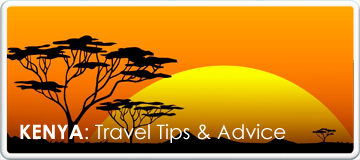
Kenya - The Home of African Safari
Kenya offers most stylish tourism infrastructure in East Africa. From the plains of the Masai Mara to the white sandy beaches of its coast, there is no place like Kenya for an African Safari holiday. Read More...>
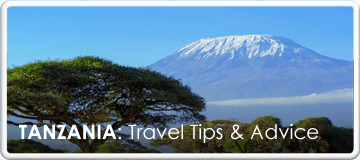
Tanzania - Land of Mt. Kilimanjaro
Tanzania is a breathtaking destination for a first-time safari and for experienced safari enthusiasts alike. The wildlife sanctuaries of Ngorongoro and the Serengeti remains unexploited. Read More...>
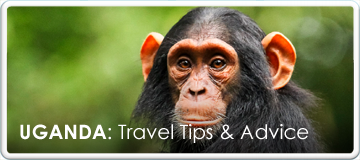
Uganda - Meet Gorillas in the Mist
Many people travel to Uganda to see the Mountain Gorillas that it is famed for. Often referred to as the Pearl of Africa, it is home to half of world's remaining population of gorillas. Read More...>
1. Travel Light!
Travel Light! Put valuables that you absolutely need in your carryon (i.e. camera, passport, jewelry etc). Leave most valuables at home. Use packing cubes to pack by destination and daily use items. For example, an electronics cube, a toiletries cube, and clothing cubes in sets. That way you can leave clothing cubes packed up that you aren’t using at a destination. Check baggage allowance for flights. You’re going to have a greater allowance for an international flight than for a quick one or two hour flight within the country. Talk to your first hotel about leaving belongings there, as you won’t be able to take large suitcases on tiny charters into the national parks.
2. Check Visa Requirement in Advance
I suggest the multi-entry visa on arrival, as you might get coaxed into a day trip (I did!). You’ll likely need new the following for your visa on arrival: Passport photos, Proof that you have somewhere to stay in the country (i.e. hotel reservation or safari booking information), Proof that you have a flight out or enough funds to purchase a flight out of the country.
3. Take New Dollar Bills!
USD is widely accepted in Africa, and for many visas you are required to pay in USD. Therefore it’s a good idea to carry a good stack of fifties on you for whenever the need arises. Some countries like Liberia and Zimbabwe actually use the USD for daily business. Make sure you take large bills no older than Series 2006. Many places in Africa will not accept older bills than this, and many places will not accept $10, $5 and $1 bills at all. Also, to avoid carrying large amounts of cash try and use the ATM’s where possible – they’re widespread and accept credit cards and Plus cards. This will save you the anxiety of carrying large bundles of cash in your pockets. Typically, I suggest that a person pulls cash from an ATM at the airport on arrival, to ensure the best currency conversion rate. However, in the countries I visited (Zambia, Botswana, and Tanzania), US dollars were preferred. In fact, upon arrival to the Tanzania airport, we could only pay for our visas in cash with US dollars. Keep some singles and fives on hand to tip: It goes a very long way in developing nations and best suits the following types of care-takers who work in service: Drivers, Hotel House-Keepers / Butlers, Tour Guides, Luggage Porters, Waiters and Bar Tenders.
4. Get a Light Water Bottle
It’s not advisable to drink the tap water in most of Africa. We previously used the Lifestraw Go for all those times during our travels when the water is questionable. However, over time we became annoyed with the water bottle as the filter aged and clogged. Plus the bottle leaks when it is on its side. We now switched to the Grayl Ultralight Purifier. It’s a more simplistic design than the Lifestraw that is more effective and does not leak. Most importantly it is a purifier, not a filter. The Grayl water bottle system purifies water vs. filters which removes viruses and virtually removes all threat of waterborne illnesses.
5. Take a Smartphone!
The first time I went to Africa I just took a very old brick phone, but times have changed a lot since then! Cellphone carriers are now surprisingly good. 4G is now available in most places and cheap – you might only pay $10 or so for unlimited data for a month. Some people think Africa is so backward that people are still sending letters by pidgeon, but nothing could be further from the truth. The “Nokia revolution” has totally transformed Africa, and in many ways they’re ahead of the western world in this regard. Even farmers living in small huts way out in the villages have cellphones and even do business over Whatsapp and receive payments in mobile money.
6. Take Caution Against Malaria
Malaria is no joke – it’s a big problem in Africa and millions die from it every year. However, don’t let the fear of this ruin your trip. Malaria is easy to prevent and with the proper precautions you’ll be fine. Malarone and Doxycycline are the two most common anti malarials. Malarone is the more expensive option (around $7 a pill), but has the least side effects. Doxy is far cheaper (a 6 month supply may only cost $50) but it renders your skin sensitive to sunlight, meaning you’ll burn easier, and some people experience hallucinations. No big deal. Also, since a malaria treatment was developed in 2015, it’s a less serious issue than it used to be. However, that doesn’t mean you want to catch it! Thankfully, malaria is not easy to catch, it’s a specific species of mosquito called Anopheles that carries it and it struggles to live at altitudes above 1,500m. That means in places like Addis Ababa and Nairobi you can relax a little, however seaside towns like Zanzibar and Mombasa require extra vigilance. The obvious prevention method here is to use insect repellent whenever outdoors at night, in the bush, or wherever mosquitoes might be found. If you don’t get bitten, you’re safe!
7. Learn About HIV and AIDS
To some people HIV and Africa are almost synonymous. That’s a little bit sad. People seem to be arrested with the fear that just spending time on the continent will put them at risk. I was extremely poorly educated on the topic on my first trip to Africa. Turns out, HIV is a very difficult disease to contract. Don’t have unprotected sex, don’t get a blood transfusion, don’t use needles. Easy! Also, awareness about HIV has risen dramatically in the last ten years, and in many countries sufferers are offered free treatment and are able to live long, healthy lives. Don’t let the HIV stigma stop you from enjoying the continent. Use a condom if you have to engage in any sexual activity with the local people!
8. Don't Forget Sunscreen Lotion
Skin cancer is for real! Don’t forget your SPF when traveling to the around Africa as you’re close to the Equator. We recommend ordering some online before leaving the house as you will need it underneath the African sun and it can be very hard to find in grocery stores in Africa (and when you do find it the pricing will be insane). We highly recommend getting an eco friendly sun cream that does not contain harmful chemicals. They’re mineral based and usually only cost a few dollars more to help protect our oceans. If you’re not going to swim in the ocean just go with a reliable name brand. This can be hard to find in some African countries, simply because the local population have no need for it. When you do find it, it’ll be expensive and you’ll be lucky to find your favourite brand. Take your own from home.
9. Get a Diarrhoea Vaccine or Probiotics
This is an oral vaccine that protects you from traveller’s diarrhea. Drinking it will iron plate your stomach for 3 months so you have a much lesser chance of pooping water. I had this vaccine on my first few Africa trips, ate all sorts of crap and never had diarrhea once! However while Ducharal is great, I’ve now moved on to a more natural way of keeping my stomach healthy on these trips – probiotics. Probiotics are the gut flora in your digestive system that help build your immune system and break down any nasties in your stomach. Studies have shown that superloading with probiotics and taking them regularly during a trip greatly decreases the risk of traveller’s diarrhea, and is also excellent for your health in general.
10. Dress Down! In Neutral Earth Colours
Remember that poverty is still a big problem here, and you’ll come across many people who struggle day to day, including an abundance of homeless people and street kids. While they don’t present any particular danger in most cases, it helps to not flaunt your expensive things and draw attention to yourself. Another thing you should be mindful of is the culture. While short shorts and low cut blouses and tank tops might be normal wear back home, they’re not here. That means easy on the bling bling and no flashy clothes. For the ladies, try and stay covered up as best as possible. Don’t pack a lot of white clothing. One thing you’ll notice about many African cities is not all the roads and footpaths are paved. This leads to a lot of dust and dirt in the air. For this reason, I always avoid taking white clothes, especially socks! They get brown very quickly, and you’ll probably end up hand-washing them as washing machines are non-existent outside the big cities. Also, take a pair of sunglasses for when you’re wandering around. Your eyes will thank you.
11. Take a Torch and a Power Bank
Powercuts are widespread and frequent, and many areas don’t have electricity. While the torch on your phone is usually sufficient, I’d highly recommend taking a headlamp, especially if you’re going hiking, camping, on safari, or visiting rural areas. Trust me, you’ll thank me later. Also, take a good powerbank. I use this one and it has saved my butt on many occassions!
12. Be Careful Who and What You Photograph
You’re going to come across some amazing photo opportunities of local people doing things you’ve never seen before. While your first inclination may be to pull out the camera and snap, try to refrain from doing so as local people will often take offense at you taking photos of them. In fact, many people will approach you and ask you for money if they catch you. Use your zoom and take your snaps from afar or just be discreet. If you wish to get up close and take your perfect photo, ask permission first. Alternatively, take the photo and then offer a “tip” afterwards (one small bill will suffice – usually just a few dollars). It’ll keep the peace and they’ll appreciate your respect.
13. Get a Telephoto Lens for your Camera
Although you’re going to get closer to the African animals than ever before to really capture them on camera requires a telephoto lens. Something around 200mm plus should do the job. Want to know what some of the best wildlife photographers use? Check out our guide to a camera for safari. The doesn’t mean you’re going to need an 800mm lens, that costs as much as a car. However, get ready for lens envy while on safari because some take photography pretty seriously. We travel with a Fuji X-T3 with a 200mm lens.
14. Bring a pair of Binoculars
Identifying birds or spotting what animal is on the horizon requires some great eyes or a good pair of binoculars. Since most of us do not have the eyes of an eagle we’d say a pair of binoculars is crucial. We recommend you pick up a decent pair that will last longer than one trip. Here are our 10 favorite safari binoculars with in-depth reviews.
15. Double-check your Toileteries
Especially if going on safari, camping, hiking, or any outdoors activity. Trust me, they’ll come in handy. Toiletries that most hotels are less likely to have include; Tooth Paste, Tooth Brush, Mild Deodorant, Face wipes / make-up removing wipes, Face wash, Face moisturizer Shaving cream, Razor, Feminine care products, Tweezers, nail clippers, Safety Pins. Take a Hand Sanitiser. If you’re planning a few trips off the beaten track you’re bound to be touching all sorts of dirty things and have local children jumping all over you. Keeping a bottle of this handy is a lifesaver. Hard to find in some places, so take your own from home.
16. Use a VPN! (Virtual Private Network)
Especially if going on safari, camping, hiking, or any outdoors activity. Trust me, they’ll come in handy. Toiletries that most hotels are less likely to have include; Tooth Paste, Tooth Brush, Mild Deodorant, Face wipes / make-up removing wipes, Face wash, Face moisturizer Shaving cream, Razor, Feminine care products, Tweezers, nail clippers, Safety Pins. Take a Hand Sanitiser. If you’re planning a few trips off the beaten track you’re bound to be touching all sorts of dirty things and have local children jumping all over you. Keeping a bottle of this handy is a lifesaver. Hard to find in some places, so take your own from home.
17. Be Smart With The Hustlers
While walking around the streets you’ll get some unwanted attention. Guys will try to sell you arts and crafts or lure you to souvenir stores in an effort to earn a commission. That’s fine if you’re interested, but chances are you’re not. If any case these people are harmless and are just an annoyance more than anything else, so the trick is to just be cool and relaxed rather than hostile. When they ask if it’s your first time visiting just say “No, I come every year, my brother lives here” or something like that. Once they realise you’re not a clueless tourist they’ll most likely chit chat with you for 10 more seconds before moving on to a more promising target.
18. Get a Good, Knowledgeable Driver
At AfriChoice, we shall arrange your driver in advance and you will be picked from the airport. However, if you are on own arrangemnts, get the phone number of a reliable taxi driver. Otherwise ask the hotel staff for a reliable taxi. Keep his number in your cellphone or even better, memorise it. Also, in many of the major cities they now have Uber, so make sure you download it! It’s cheap and has been extremely useful for me, especially as you can avoid the whole haggling part of getting a taxi.
19. Pack a First Aid Kit
A standard first aid kit can come in handy in a place where ambulances are scarce and hospital services are scarce or don’t exist. That means bandages, antiseptics, prescription antibiotics, a pocketknife, sterile needles (some hospitals don’t have these), DEET, anti diarrheals and painkillers.
20. Get a Power Socket Adaptor
If you’re coming from North America, you’ll need a power adapter anywhere in Africa. Several different types of plugs are found throughout the continent, though, so a universal adapter is the way to go. If you’re headed to southern Africa, you’ll want to bring a South Africa-specific adapter as well, as that plug is a different kind entirely.
21. Get a Dust-proof Bag for your Electronics
In the winter months (June to October), the game reserves can be extremely dusty. Contact lens wearers should bring eye drops and eyeglasses, to avoid eye irritation. Clean camera and video lenses regularly and store in a camera bag, while on safari.
22. Wake Up Early! Enjoy Sunrise and Sundowner!
It’s something you’re going to have to learn to live with in Africa. Animals are most active in the morning and evening, as the mid-day is too hot for them to be moving around. This is why most safari days consist of two game drives, a morning one and an evening one. The morning typically involves waking up at the crack of dawn and having coffee on the go. Evening game drives are our favorite since they leave in the afternoon and end with a cold gin and tonic.
23. Ask Questions
Don’t be afraid to ask questions. I may be guilty of wanting to know it all, but showing some curiosity creates for a better safari and will probably make your guide happy. The safari guest learns more and develops a better understanding of African wildlife and what they are seeing. We find that the curiosity brings the passion out of our guides and enhances our whole game drive experience.
24. Dont Be Afraid - Use Common Sense!
I'll admit it: Before traveling to Africa for the first time, I was afraid. Afraid of being victimized by criminals, of becoming ill with some hideous disease, of being alone and surrounded by throngs of people whose culture and language I didn't understand. But when I arrived, I realized most of my fears were unfounded. Taking the same precautions you would take while traveling anywhere will help you avoid many problems in Africa. I found that most individuals I encountered were friendly and willing to help when I was in need. Once, when I broke the chain on my bike while cycling in a rural area, a local bike repairman (apparently tipped off by some kids) came out of nowhere and brought me a new chain. We didn't have any common language, but my bike and I were up and running again in minutes. Despite what people think Africa is not a wild, lawless place. Of course there’s crime, but common sense will be sufficient to keep you safe. Don’t go out alone at night – take a local male with you. When you arrive in the country, ask someone you can trust such as a tour guide or hotel staff about the danger spots in the city. If you always have an escort at night and don’t go wandering, you’ll be in no more danger than you would be in your home country.
25. Appreciate by Giving a Good Tip
Should we tip, and if so - how much?? This is a common dilemma for most visitors to any foreign country! In Africa, tipping is not expected but is customary. The traditional gratuity to safari guides or camp staff is not included in the price of your tour and is completely discretionary. Bear in mind that what may seem like an inconsequential amount to you may be significant to local African staff and will certainly be received with a display of gratitude that is genuinely humbling. Most safari lodges will have a ‘tip box’ at reception for the staff – this covers all the ‘unseen’ services you have enjoyed during your stay, including the housekeeper and kitchen staff. Guidelines: Tip moderately and in accordance with the level and quality of service provided – and only if you are satisfied with that service. Tips can be paid in US dollars or local currency. Use the following guide: Driver/guide - US$10 and upwards per day. Private safari guide - US$25 and upwards per day; Camp staff - US$10 to $20 per day, as a pooled tip to be shared among the housekeepers, waiters, bartender, etc. If you spend a great deal of time with a single guide, consider increasing the above amounts in accordance with the enthusiasm and effort displayed (or your overall satisfaction level).
SEE ALSO: General Africa Travel Tips and Advice
Top 3 Tips To Remember!

Be Ready To Be Inspired by Africa!
Africa has her mysteries and even a wise man cannot understand them. But a wise man respects them!
Described in Karen Blixen own words, "There is something about safari life that makes you forget all your sorrows and feel as if you had drunk half a bottle of champagne - bubbling over with heartfelt gratitude for being alive!" Without doubt, nowhere in the world canadventure and leisure travel be so perfectly mixed and matched - Africa, full of adventure opportunities, bears the secret! Nothing but breathing the air of Africa, and actually walking through it, can communicate the indescribable sensations. I never knew of a morning in Africa when I woke up that I was not happy!
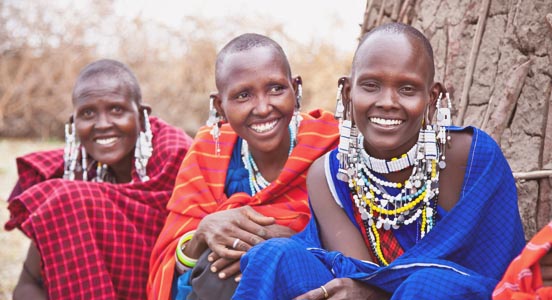
Be Ready To Meet Beautiful People!
Africa has it all - be prepared for beautiful people and happy children in a beautiful continent!
I’ve yet to see an unhappy child in Africa. I’m not saying that there aren’t unhappy kids in Africa, but the children I’ve come across in the villages, on the beaches, on the streets are always smiling, laughing, and full of joy. They mostly seem to get a kick out of any foreigner around! My favorite thing to do is make funny faces at them and they’re happy to reciprocate. Most of the African people are warm, friendly, and hospitable. We often found that they are just as interested as us as we are in them. Be prepared for beautiful people and happy children in a beautiful continent.

Be Ready To Take Home Sweet Memories
The only man I envy is the man who has not yet been to Africa – for he has so much to look forward to!
Africa, as we all know, is a continent with a huge variety of landscape, climate and culture! It is exciting, addictive and awe-inspiring. When you have had a taste of it, you will never want to leave. Visit Kenya, Tanzania and Zanzibar. The parks will include Amboseli National Park , Lake Naivasha, Masai Mara Game Reserve, Serengeti National Park, Ngorongoro Crater and Zanzibar Beach. Arrive open-minded and ready to experience new things! Things that create lasting memories. After two weeks in this African paradise you will leave with romantic safari memories that will last you a lifetime!
Proven EXCELLENCE through years of EXPERIENCE!
We are Africans. We Know Africa Better. We Love what we DO!
Related Pages: Explore Other Services By AfriChoice...
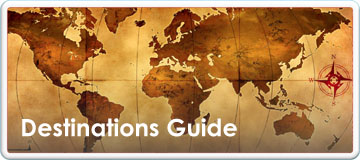
Africa Destination Guide
Explore Africa's leading destinations in a stylish and affordable way. Known for its concentrations of wild animals, it is the quintessential holiday destination for travellers from all over the world. Read More...

Transportation & Car Hire Services
Whether you are travelling to Africa for leisure, adventure or for business, as an individual or as a group, we have the widest range of cars for your transfers and safari transportation. Read More...

Recommended Hotels and Lodges
Enjoy upto 50% Off Standard Rates! Our network of hotel suppliers in the region has given us access to lowest rates, yielding savings which we pass on directly to you - Book with us and Save!. Read More...